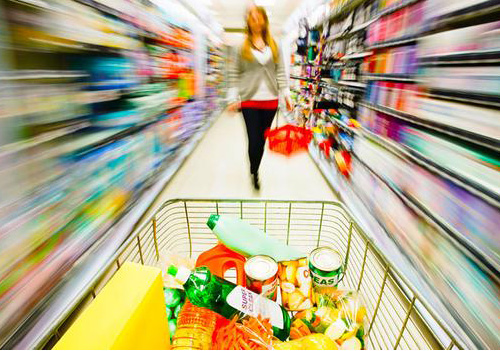当前位置: Language Tips> 双语新闻
Healthy eating: The mind games of supermarkets

|
Every time you enter the supermarket, you're being manipulated. By design, all of the basics you're just dropping by to pick up lie on the far side of a sea of temptation: the eggs, milk, and bread are blocked by fruit snacks, those fancy new chips, and a display of artisanal beef jerky. If that wasn’t enough, your kids are targets too: all the cereal at the eye level of a child sitting in a shopping cart is pasted with cartoon blandishments, the better to lure them in with. But could we be manipulated for the better? The average food manufacturer has little reason to divert us from their high-fat, high-sugar, high-deliciousness products. Yet given that we are already being influenced, one can wonder whether stores might eventually see the benefit – perhaps administered through public health-related tax cuts – to making the produce section into a wonderland that has the kids screaming for kale. Even within our current stores, it isn't difficult to nudge people in a better direction, at least in the short term. Esther Papies, a professor of social psychology at Utrecht University in the Netherlands, found that handing out recipe flyers at a store entrance that included words like "healthy" and "low-calorie" caused people who were overweight or dieting to subconsciously buy fewer snacks. They took a whopping 75% fewer snack items to the checkouts than those who received the control flier, which did not have the health-related terms on it. Seeing those words – being primed by them – activated people's existing goals and reminded them what they could do now to meet them, without the shoppers really taking notice, says Papies. Other tricks have been proposed by Brian Wansink, a professor of consumer behaviour at Cornell who's well known for his research into the psychology of eating. Some of his latest work takes an earlier finding – that people increase their fruit and vegetable intake by 24% if they are told that half of their dinner plate should be reserved for these foods – and applies it to supermarket shopping. Wansink found that dividing a grocery cart in two, with half to be used only for fruits, vegetables, dairy, and meat, causes people to spend more than twice as much on fruits and vegetables than people without a partition – $3.65 versus $1.82 on fruits and $5.19 versus $2.17 on vegetables. The idea is that the partition implies the existence of a social norm that consumers try to meet. |
每每进超市,你都被操控。你本来是来买鸡蛋、牛奶、面包这些必需品的,但是超市将这些东西都设计在很远的地方,要买到它们,你必须穿过无数诱惑:果蔬小吃、新款薯片、手工牛肉干摆放区。如果这样你都无动于衷,那还有你的孩子:坐在购物车里的孩子平视之处就是谷类食品,上面的卡通图案就像在“召唤”他们。 但我们能不能被操控着去买更健康的食物呢?生产商没有理由劝我们不买大众偏爱的高脂、高糖、高香精食品。但既然我们已经被影响了,有人就想了,店家最终能否看清个中利益呢——或许,公众健康类税收优惠是个解决之道——把食品区变成一个乐园,让每个孩子都争着抢着要甘蓝菜。 至少短期来看,即使在目前的商店内,要把顾客引往健康食品区也不是太难。荷兰乌得勒支大学(Utrecht University)社会心理学教授埃斯特·佩皮斯(Esther Papies)发现,在商店入口发放印有“健康”和“低卡路里”字样的食谱传单,能让超重和节食人群下意识地少买些零食。比起那些拿到未印有健康信息传单的人来说,前者少买了75%的零食。佩皮斯说,看看这些词的魔力,它能潜移默化地激励人们从现在做起,提醒他们努力实现目标。 因研究饮食心理而闻名的康奈尔大学消费者行为学教授布莱恩·文森克(Brian Wansink)也揭秘了一些小伎俩。他近期的一些研究也用到了早期的发现——如果告诉消费者,他们的餐盘要留一半放水果和蔬菜,人们会多吃24%的果蔬——超市购物亦是如此。文森克发现,将购物车一分为二,其中一半规定只能放水果、蔬菜、奶制品和肉制品,此类消费者会比一般人多买一倍多的水果蔬菜——水果:$3.65比$1.82,蔬菜:$5.19比$2.17。秘诀就是,划分让消费者觉得这是一种社会规范,他们就会尽量去做到。 |
|
|
上一篇 : 美国老外热爱普通话 倾心于教育事业
下一篇 : 十八世纪北极探险沉船重见天日
关注和订阅


电话:8610-84883645
传真:8610-84883500
Email: languagetips@chinadaily.com.cn